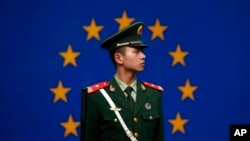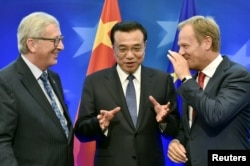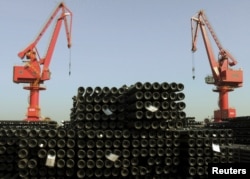China and the European Union on Friday will seek to save an international pact against climate change that U.S. President Donald Trump appears to be set to pull out of.
As China emerges as Europe's unlikely global partner on areas from free trade to security, Premier Li Keqiang will meet top EU officials at a summit in Brussels that will also discuss North Korea's missile tests.
In a statement backed by all 28 EU states, the European Union and China will commit to full implementation of the Paris Agreement, EU and Chinese officials said.
The joint statement, the first between China and the EU, commits to cutting back on fossil fuels, developing more green technology, and helping raise $100 billion a year by 2020 to help poorer countries cut emissions.
"The EU and China consider climate action and the clean energy transition an imperative more important than ever," the statement, by European Council President Donald Tusk, European Commission President Jean-Claude Juncker and China's Li, will say. "The increasing impacts of climate change require a decisive response."
China asked that the annual summit, normally held in mid-July, be brought forward to press home President Xi Jinping's defense of open trade at the World Economic Forum in Davos in January, in response to Trump's protectionist stance.
But Trump's plan to follow through on a campaign pledge to withdraw from the Paris accord, agreed on by nearly 200 countries in 2015, is now dominating, diplomats said.
China, which overtook the United States as the world's biggest emitter of greenhouse gases in 2007, is ready to support the European Union, despite tensions on other issues from human rights to trade, according to China's ambassador to the EU, Yang Yanyi.
"China and the EU need to steadfastly adhere to the Paris agreement," Yang said in a written briefing to reporters.
The warmer EU-China relationship, partly spurred by Trump, is despite a long-running spat with Beijing on what Europe sees as China's dumping of low-cost goods on European markets.
"No one should be left behind, but the EU and China have decided to move forward," Miguel Arias Canete, the European commissioner who has led climate talks with Beijing, said of the Paris accord.
Free-trade forerunner?
While China needs the EU's technical know-how to fight the pollution blighting its cities, the European Union is looking to Beijing to take action against emissions blamed for increased droughts, rising seas and other effects of climate change.
Still the European Union remains cautious about the direction of its second-largest trading partner, concerned by China's steel exports, its militarization of islands in the South China Sea and a turn toward authoritarianism under Xi.
EU officials say they will bring up the South China Sea in the talks on Friday, but they will be wary to avoid a repeat of last year's tense EU-China summit in Beijing, which failed to agree to a joint statement because of the maritime issue.
China's claims in the South China Sea, through which about $5 trillion in ship-borne trade passes each year, are contested by Brunei, Malaysia, the Philippines, Taiwan and Vietnam.
The EU also wants an investment treaty with China to open the huge Chinese market to European companies and remove onerous rules forcing them to share know-how.
A senior Chinese official said China is determined to open up and reach a deal, which is seen as a forerunner to a possible future free-trade accord.







